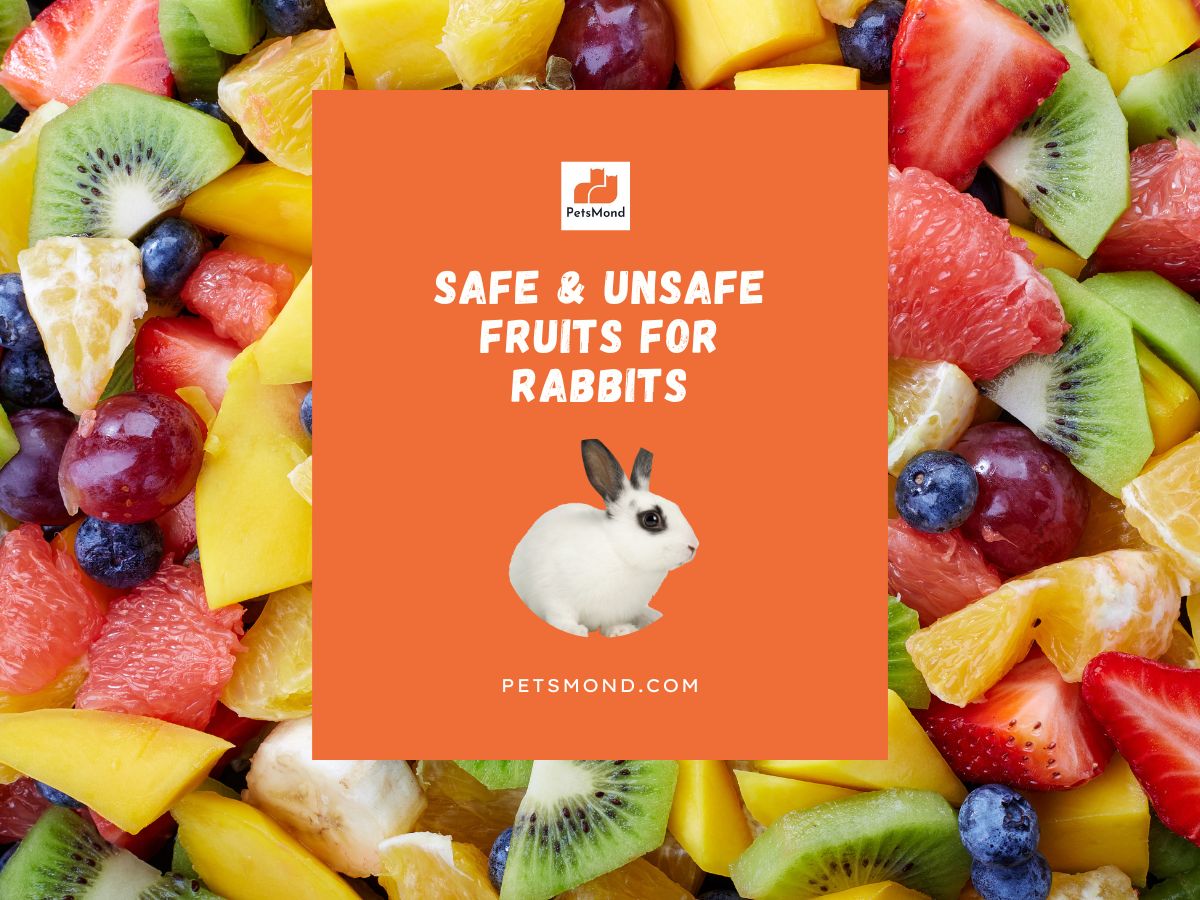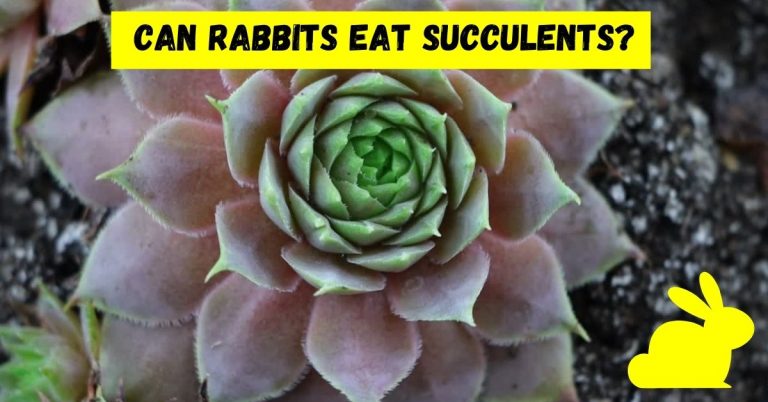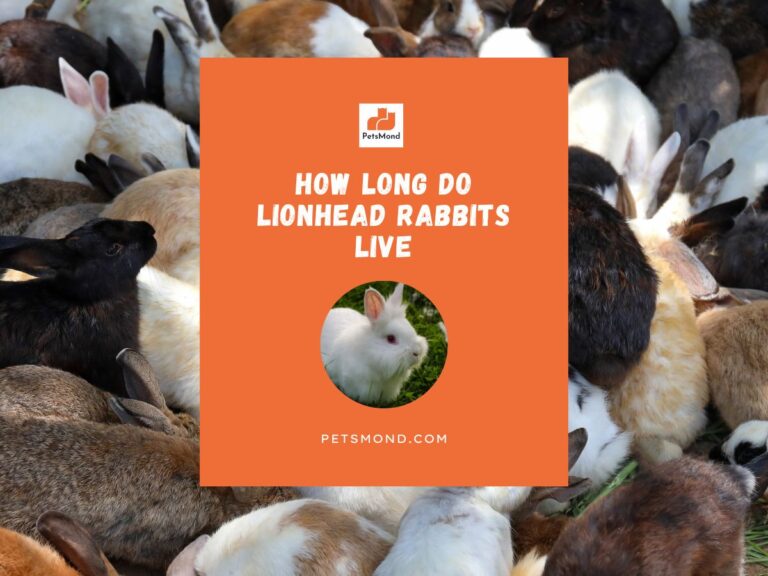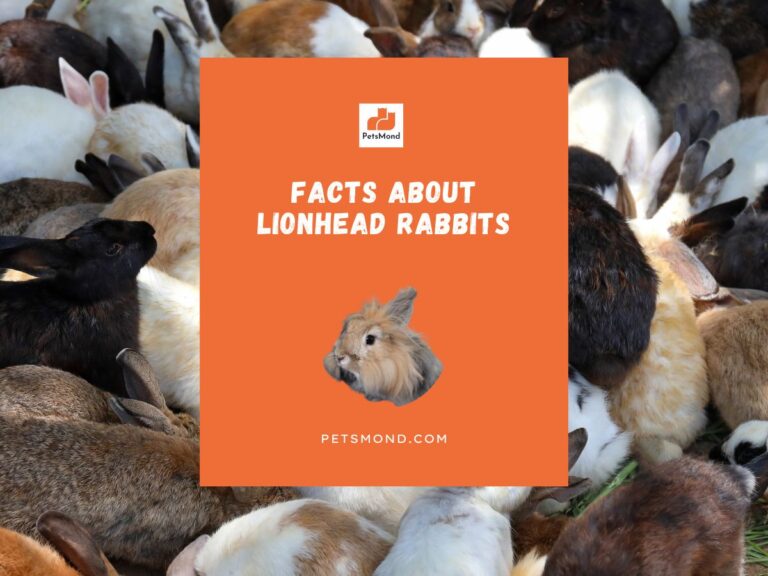28 Fruits Safe For Rabbits (& 8 Unsafe Fruits)
When you’re thinking of the perfect diet for rabbits, it’s natural to think of vegetables and fruits in addition to hay. What’s the truth? Are fruits safe for rabbits?
Fruits are moderately safe for rabbits. However, not all of them are safe. This is because of the vulnerability to chemicals and some fruits also contain high sugar levels, thereby making them inappropriate for rabbit consumption.
If you require an extra hand to understand the ideal fruit for rabbits, this is the only guide to take a look at as I cover:
- List of fruits safe for rabbits
- Can rabbits eat fruits?
- Should rabbits eat fruits?
Let’s begin!
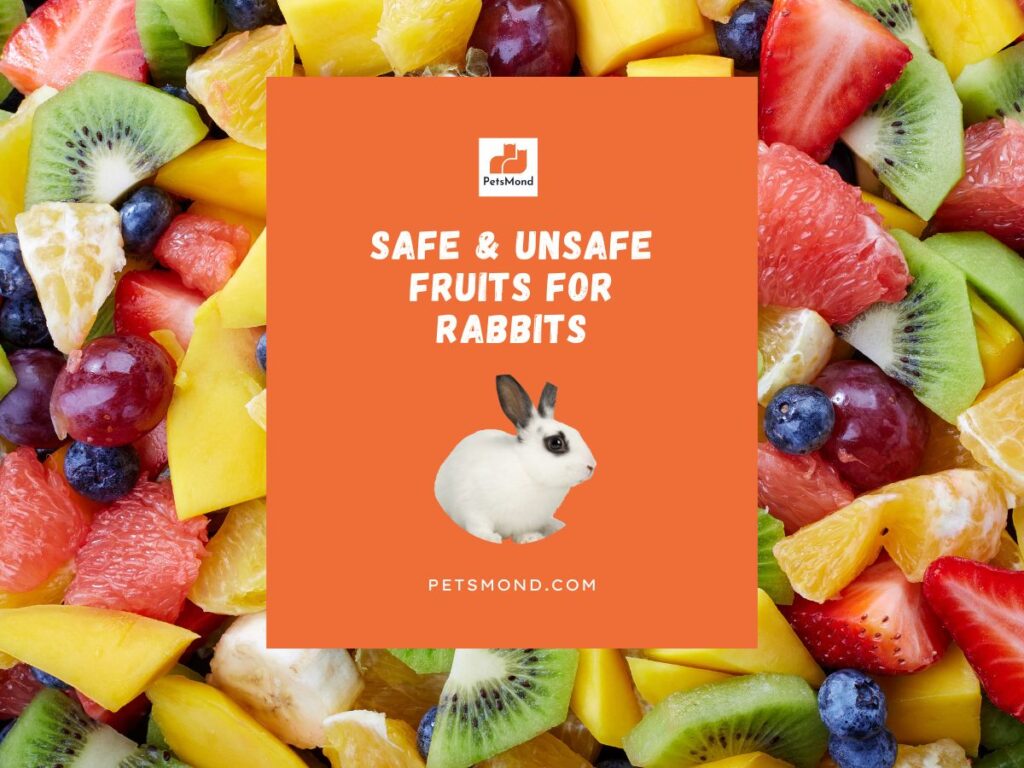
List of Fruits Safe for Rabbits
The first thing that you should do when you’re feeding a fruit is to ensure that it’s safe or not. Further, the exact portion and part of fruit that’s safe should also be known.
If you’re running short of time and need to know about a fruit quickly, here’s a tabulated version.
| Fruit | Safe/Unsafe | If safe, which parts? | Average Portion Size (Piece) |
|---|---|---|---|
| Apple | Safe | Flesh | 2-3 |
| Apricot | Safe | Flesh | 2-3 |
| Avocado | Unsafe | ||
| Banana | Safe | Flesh | 2-3 |
| Blackberries | Moderately safe | Flesh | 1 |
| Blueberries | Moderately safe | Flesh | 1 |
| Cherries | Moderately safe | Flesh | 1 |
| Cranberries | Moderately safe | Flesh | 1 |
| Cucumbers | Safe | All | 4 |
| Dates | Moderately safe | Flesh | 0.25-0.5 |
| Fig | Safe | Flesh | 0.5-1 |
| Grapefruit | Safe | Flesh | 1-2 |
| Guava | Moderately safe | Flesh | 0.5-1 |
| Jackfruit | Moderately safe | Flesh | 0.25-0.5 |
| Kiwi | Moderately safe | Flesh | 0.5 |
| Lemon | Unsafe | ||
| Lime | Moderately safe | Flesh | 0.5 |
| Mango | Safe | Flesh | 1-2 |
| Melon | Safe | Flesh | 2-3 |
| Nectarine | Safe | Flesh | 1-2 |
| Olives | Unsafe | ||
| Oranges | Moderately safe | Flesh | 1-2 |
| Papaya | Safe | Flesh | 1-2 |
| Peach | Safe | Flesh | 1-2 |
| Pear | Moderately safe | Flesh | 1 |
| Persimmon | Unsafe | ||
| Pineapple | Moderately safe | Flesh | 0.5-1 |
| Plum | Moderately safe | Flesh | 0.5-1 |
| Pomegranate | Unsafe | ||
| Raisins | Unsafe | ||
| Raspberries | Moderately safe | Flesh | 1 |
| Star fruit | Unsafe | ||
| Strawberries | Moderately safe | Flesh | 0.5-1 |
| Tangerine | Moderately safe | Flesh | 0.5-1 |
| Tomato (green) | Unsafe | ||
| Watermelon | Safe | Flesh | 1-2 |
Once you’ve finalized the fruit you’re planning to give, check out the respective section and understand the fruit better. This will avoid any possible negative consequences.
Apple
Apples are a delicious and healthy fruit that many people enjoy, and the good news is that rabbits can also safely eat apples! Apples are a great source of vitamins and fiber, which can help keep your bunny healthy and happy. However, it’s important to know which parts of the apple are safe for rabbits to eat and how to feed them to your furry friend.
While the flesh of the apple is safe and healthy for rabbits, the seeds, core, and stem are not. These parts of the apple contain trace amounts of cyanide, which can be toxic to rabbits if consumed in large amounts. So, make sure to always remove the seeds, core, and stem before giving your bunny an apple to snack on.
As for the apple peel, it’s generally safe for rabbits to eat, but it’s important to thoroughly wash the apple before feeding it to your bunny. This will help remove any dirt, germs, or pesticides that may be on the apple peel. Additionally, it’s a good idea to cut the apple into small pieces to prevent your bunny from choking on it.
The table below shows how much apple you can give your rabbit per week based on their age:
| Age of Rabbit | Amount of Apple Per Week |
|---|---|
| Up to 6 months | 1-2 small pieces |
| 6-12 months | 2-3 small pieces |
| Over 1 year | 3-4 small pieces |
Apricot
Apricots are a delicious and juicy fruit that many people enjoy, but can rabbits eat apricots too? The good news is that apricots are safe for rabbits to eat in moderation. Apricots are a good source of vitamins and fiber, which can help keep your bunny healthy and happy. However, it’s important to know which parts of the apricot are safe for rabbits to eat and how to feed them to your furry friend.
When it comes to feeding your rabbit apricots, it’s important to only give them the flesh of the fruit. The skin, pit, and leaves of the apricot are not safe for rabbits to eat and can be toxic to them. So, make sure to always remove the skin and pit before giving your bunny an apricot to snack on.
The table below shows how much apricot you can give your rabbit per week based on their age:
| Age of Rabbit | Amount of Apricot Per Week |
|---|---|
| Up to 6 months | 1-2 small pieces |
| 6-12 months | 2-3 small pieces |
| Over 1 year | 3-4 small pieces |
Avocado
Avocado is a unique and delicious fruit that many people enjoy, but can rabbits eat avocado too? The answer is no. Rabbits should not eat avocado because the fruit is toxic to them. The pit and skin of avocados contain a toxin called persin, which can cause serious health problems in rabbits, including respiratory distress, fluid accumulation around the heart, and even death.
Check out the detailed article: can rabbits eat avocados?
It’s important to note that no part of the avocado is safe for rabbits to eat, including the flesh. So, it’s best to avoid giving your bunny any avocado at all.
Bananas
Bananas are a sweet and delicious fruit that many people enjoy, and the good news is that rabbits can safely eat bananas too! Bananas are a great source of vitamins and fiber, which can help keep your bunny healthy and happy.
When it comes to feeding your rabbit bananas, it’s important to only give them the flesh of the fruit. The peel and stem of the banana are not safe for rabbits to eat and can be difficult for them to digest. So, make sure to always remove the peel and stem before giving your bunny a piece of banana to snack on.
Check out the detailed article here: can rabbits eat bananas?
The table below shows how much banana you can give your rabbit per week based on their age:
| Age of Rabbit | Amount of Banana Per Week |
|---|---|
| Up to 6 months | 1-2 small pieces |
| 6-12 months | 2-3 small pieces |
| Over 1 year | 3-4 small pieces |
Blackberries
Blackberries are a delicious and juicy fruit that many people enjoy, and the good news is that rabbits can safely eat blackberries too! Blackberries are a great source of vitamins and antioxidants, which can help keep your bunny healthy and happy.
It’s important to only give them the flesh of blackberries. The leaves, stems, and seeds of the blackberry are not safe for rabbits to eat and can be difficult for them to digest.
The table below shows how much blackberry you can give your rabbit per week based on their age:
| Age of Rabbit | Amount of Blackberry Per Week |
|---|---|
| Up to 6 months | Nil |
| 6-12 months | 1 small piece |
| Over 1 year | 1-1.5 small pieces |
Blueberries
Rabbits can safely eat blueberries too! Blueberries are a great source of vitamins and antioxidants. It’s important to only give them the flesh of blueberries. The skin and leaves of the blueberry are not toxic to rabbits, but they can be difficult for them to digest.
Remember that blueberries can only be considered as treats. Don’t overload your rabbit because your rabbit likes it.
The table below shows how much blueberry you can give your rabbit per week based on their age:
| Age of Rabbit | Amount of Blueberry Per Week |
|---|---|
| Up to 6 months | Nil |
| 6-12 months | 1 small piece |
| Over 1 year | 1-1.5 small pieces |
Cherries
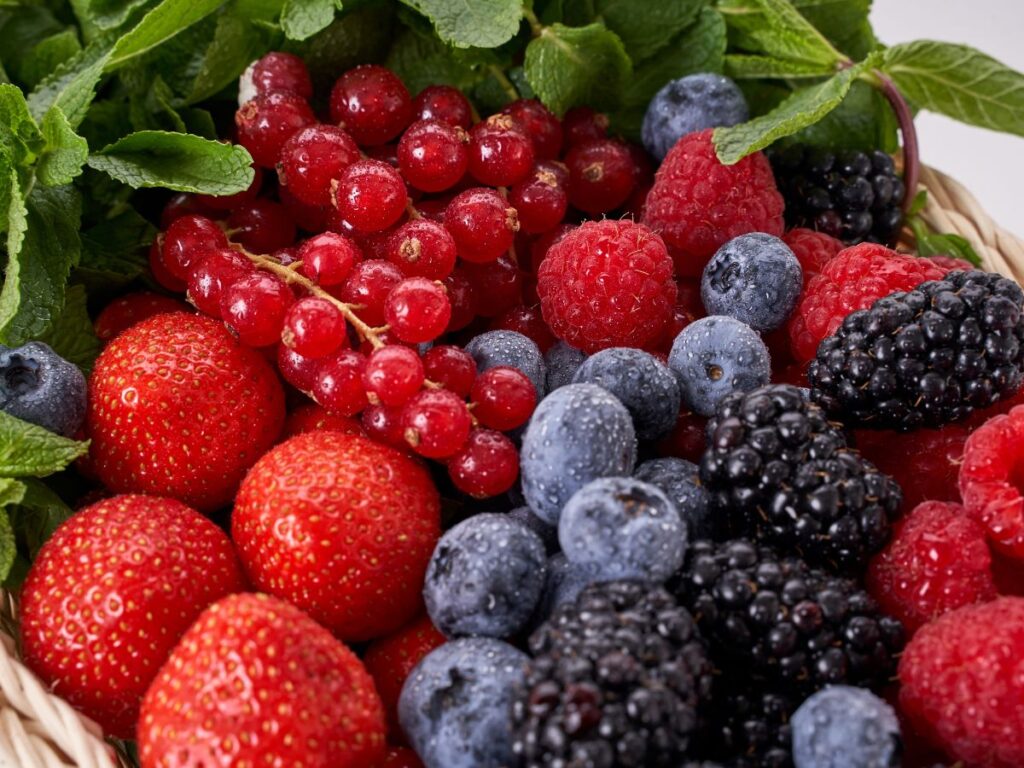
Cherries are a delicious and nutritious fruit that many people enjoy, but can rabbits eat cherries too? The answer is yes, but with some important precautions. Cherries are a great source of vitamins and antioxidants.
When it comes to feeding your rabbit cherries, it’s important to only give them the flesh of cherries. The pit and stem of the cherry are not safe for rabbits to eat and can be difficult for them to digest.
The table below shows how much cherry you can give your rabbit per week based on their age:
| Age of Rabbit | Amount of Cherry Per Week |
|---|---|
| Up to 6 months | Nil |
| 6-12 months | 1 small piece |
| Over 1 year | 1-1.5 small pieces |
Cranberries
Cranberries are a tart and tangy fruit that many people enjoy, but can rabbits eat cranberries too? The answer is yes, but with some important precautions. Cranberries are a great source of vitamins and antioxidants.
While cranberries are safe for rabbits to eat, they are high in sugar and should only be given in moderation. Additionally, it’s important to only give cranberries to rabbits that are over 7 months old and not already overweight, as the sugar content can be damaging to their health.
The table below shows how much cranberry you can give your rabbit per week based on their age:
| Age of Rabbit | Amount of Cranberry Per Week |
|---|---|
| Up to 6 months | Not recommended |
| 6-12 months | Not recommended |
| Over 1 year | 1-2 small pieces |
Cucumbers
Cucumbers are a refreshing and hydrating fruit that many people enjoy, but can rabbits eat cucumbers too? The answer is yes, cucumbers are great for rabbits! Cucumbers are a great source of hydration and can help keep your bunny cool and refreshed on hot summer days.
When it comes to feeding your rabbit cucumbers, it’s important to only give them the flesh of the fruit. The skin and seeds of the cucumber are not toxic to rabbits, but they can be difficult for them to digest. However, adult rabbits can eat seeds and skin too.
Something similar to cucumber is zucchini. Check out this article: can rabbits eat zucchini?
Here’s a table explaining the ideal amount of cucumber per week assuming that it’s an average-sized cucumber:
| Age of Rabbit | Amount of Cucumber Per Week |
|---|---|
| Up to 6 months | 1-3 small pieces |
| 6-12 months | 3-6 small pieces |
| Over 1 year | 4-9 small pieces |
You can probably double the quantity if it’s summer and your rabbit is running short of minerals. This fruit can be that perfect solution to fix dehydration in rabbits.
Dates
Dates are a sweet and chewy fruit that many people enjoy, but can rabbits eat dates too? The answer is yes, dates can be fed to rabbits but with some important precautions. Dates are high in natural sugar, which can lead to obesity and dental problems in rabbits if consumed in excess. However, when fed in moderation, dates can be a nutritious and delicious addition to your bunny’s diet.
Additionally, it’s important to only give dates to rabbits that are over 12 weeks old and not already overweight, as the sugar content can be damaging to their health.
Note: Ensure that it is seedless so it doesn’t result in choking or digestive issues.
I wouldn’t consider this as a treat, as your rabbit can easily fall for it. So, it’s better to avoid it. In all my 11+ years of raising rabbits, I’ve never ever given one date fruit.
Figs
Figs are a sweet and nutritious fruit that many people enjoy, but can rabbits eat figs too? The answer is yes! Figs are safe for rabbits and a great source of fiber, vitamins, and minerals, which can help keep your bunny healthy and happy.
When it comes to feeding your rabbit figs, it’s important to only give them the flesh of the fruit. The skin and seeds of the fig are not toxic to rabbits, but they can be difficult for them to digest.
The table below shows how much fig you can give your rabbit per week based on their age:
| Age of Rabbit | Amount of Fig Per Week |
|---|---|
| Up to 6 months | Not recommended |
| 6-12 months | Not recommended |
| Over 1 year | 1-2 small pieces |
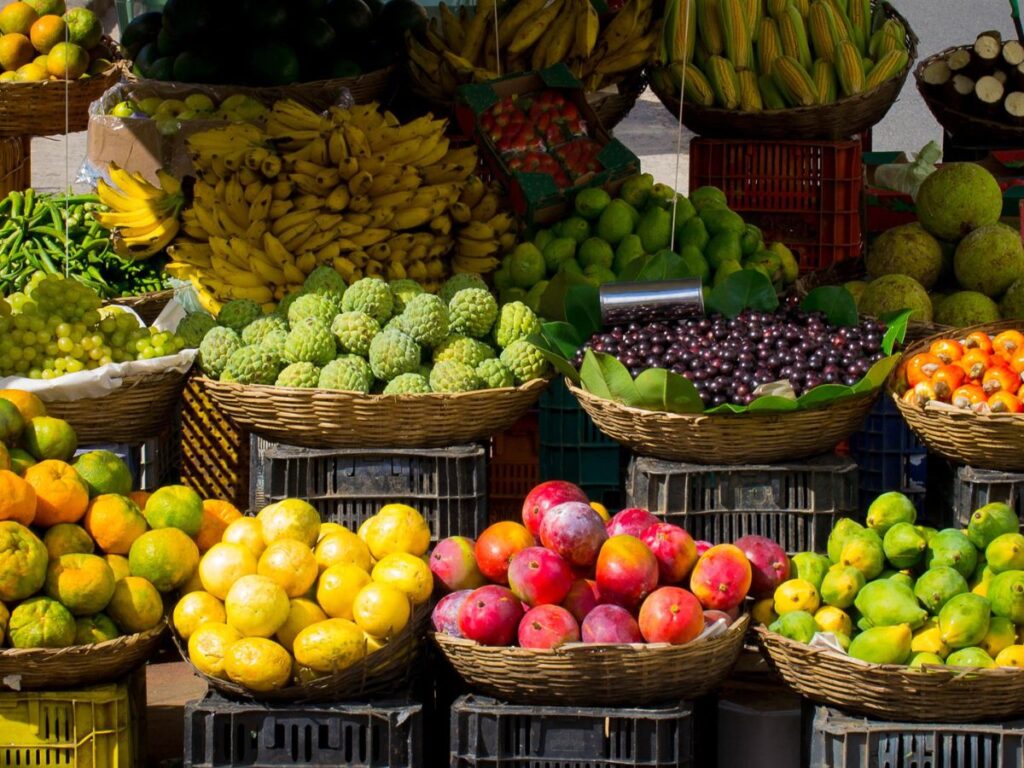
Grapes & Raisins
Grapes are a sweet and juicy fruit that many people enjoy, but can rabbits eat grapes too? The answer is yes! Raisins are a term for dried grapes, and they can be toxic to rabbits. Even a small amount of raisins can cause kidney failure in rabbits, so it’s important to keep them away from your bunny at all times.
Grapefruit
Grapefruit is a tangy and refreshing fruit that many people enjoy, but can rabbits eat grapefruit too? The answer is yes, but with some precautions. Grapefruit is a great source of vitamins, minerals and antioxidants.
Grapefruit is high in acidity and sugar, which can upset your bunny’s delicate digestive system and lead to health problems. So, make sure to only give your rabbit grapefruit as an occasional treat.
Ensure that you don’t give it every week or month!
Guavas
Guava is a sweet and tropical fruit that many people enjoy, but can rabbits eat guava too? The answer is yes, but with some precautions. Guava is a great source of fiber, vitamins, and minerals.
In fact, I wouldn’t recommend it because guava seeds are hard to digest. Instead, you can give them soft fruits that can be easy to digest and are also safe.
Jackfruit
Jackfruit is a large and unique fruit that many people enjoy, but can rabbits eat jackfruit too? The answer is yes, but with some precautions. Jackfruit is a great source of fiber, vitamins, minerals, and carbohydrates.
Jackfruit is high in sugar, which can upset your bunny’s delicate digestive system and lead to health problems. So, make sure to only give your rabbit jackfruit as an occasional treat.
Remember to give only the flesh and not the stem, seed, or sides of the fruit. If you’ve a second thought, it’s better to skip this fruit.
Kiwi
Have you ever wondered if rabbits can eat kiwis too? If yes, the good news is your rabbit can have this fruit as it’s a great source of vitamins and antioxidants. However, remember to feed your rabbit only the flesh of the fruit and not the skin or seed.
The table below shows how much kiwi you can give your rabbit per week based on their age:
| Age of Rabbit | Amount of Kiwi Per Week |
|---|---|
| Up to 6 months | Not recommended |
| 6-12 months | Not recommended |
| Over 1 year | 1-2 small pieces |
Lemon
Lemons are a citrus fruit that many people use in cooking and baking, but can rabbits eat lemons too? The answer is no. While technically, rabbits can eat lemons, it’s best to avoid giving them to your bunny altogether. Lemons are highly acidic and can upset your rabbit’s delicate digestive system, leading to health problems.
Stick to safe options like apples, bananas, and berries. If you’re looking for a way to add some variety to your rabbit’s diet, consider offering them fresh herbs as well.
Lime
Lime is a citrus fruit that is known for its tangy and sour taste. It is packed with Vitamin C, antioxidants, and other essential nutrients. The fruit is also used in various culinary dishes and beverages, making it a popular ingredient in many households.
While lime is not toxic to rabbits, it’s not recommended to feed them large quantities of the fruit. The high acidity content in the lime can cause digestive issues and upset the stomach. It’s best to offer small amounts of lime as a treat, and not as a regular part of their diet.
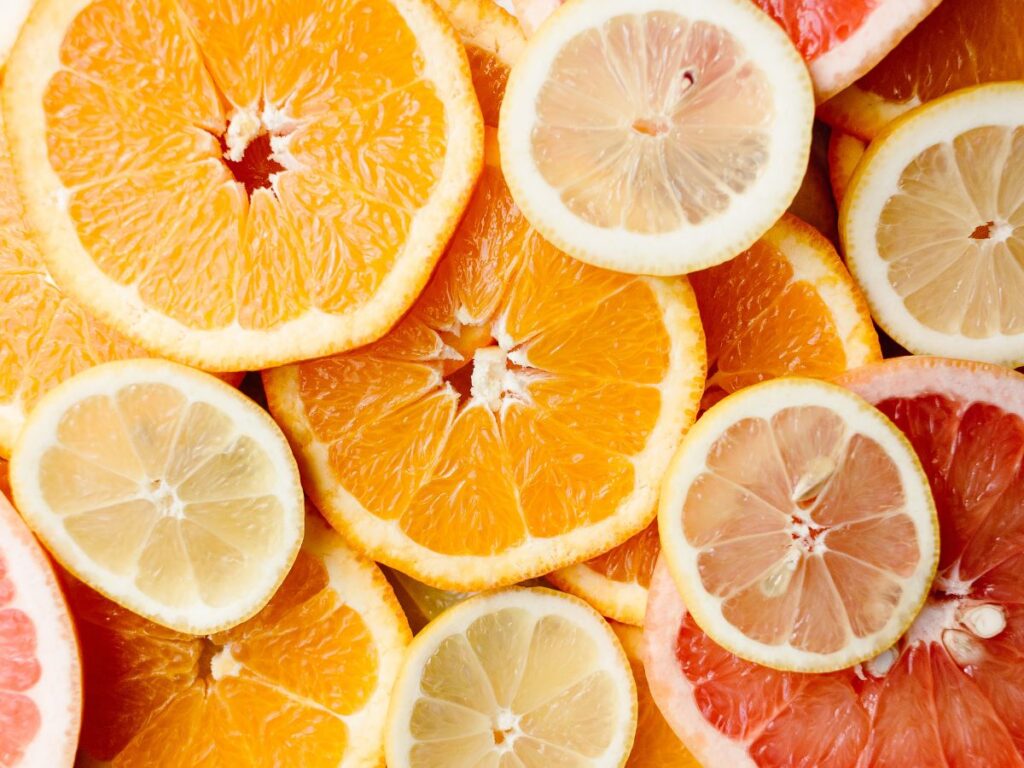
The flesh of the lime is safe for rabbits to consume, but the skin and seeds are not. The skin of the lime is difficult for rabbits to digest and can cause gastrointestinal issues. The seeds, on the other hand, can be a choking hazard and may cause an obstruction in their digestive system. Additionally, you can mix small amounts of lime juice with their water to add some flavor and provide them with a boost of Vitamin C.
Mango
Are you wondering if your furry friend can indulge in the sweet and juicy taste of mango? Mango is a tropical fruit that is known for its delicious flavor and bright orange color. It is packed with nutrients like Vitamin C, fiber, and antioxidants, making it a healthy addition to any diet.
But is mango safe for rabbits to eat? The good news is that mango is safe for rabbits in moderation. However, it’s important to note that mango is high in sugar, which can cause digestive issues and obesity if consumed in large quantities. The flesh of the mango is safe for rabbits to consume, but the skin and pit are not.
Check out the detailed article here: can rabbits eat mango?
To feed your rabbit mango safely, you can offer them small pieces of the flesh as a treat. It’s important to wash the mango thoroughly before feeding it to your rabbit to remove any pesticides or chemicals. Additionally, you can mix small amounts of mango with their regular diet to add some flavor and provide them with a boost of nutrients.
Here’s a table to help you determine how much mango you can offer your rabbit per week according to their age:
| Age of Rabbit | Amount of Mango Per Week |
|---|---|
| Under 6 months | Not recommended |
| 6-12 months | 1-2 small pieces |
| Over 12 months | 2-3 small pieces |
Melon
Melon is a juicy fruit that comes in many varieties, including watermelon, cantaloupe, and honeydew. It is packed with nutrients like Vitamin C, potassium, and fiber, making it a healthy addition to any diet. The fruit is also a great way to stay hydrated during hot summer months.
But is melon safe for rabbits to eat? The good news is that melon is safe for rabbits in moderation. However, it’s important to note that melon is high in sugar, which can cause digestive issues and obesity if consumed in large quantities. The flesh of the melon is safe for rabbits to consume, but the rind and seeds are not.
Check out the detailed article: can rabbits eat melon?
To feed your rabbit melon safely, you can offer them small pieces of the flesh as a treat. It’s important to wash the melon thoroughly before feeding it to your rabbit to remove any pesticides or chemicals. Additionally, you can mix small amounts of melon with their regular diet to add some flavor and provide them with a boost of nutrients.
Here’s a table to help you determine how much melon you can offer your rabbit per week according to their age:
| Age of Rabbit | Amount of Melon Per Week |
|---|---|
| Under 6 months | Not recommended |
| 6-12 months | 1-2 small pieces |
| Over 12 months | 2-3 small pieces |
Nectarine
Nectarines are a type of stone fruit that is closely related to peaches. They are known for their delicious flavor and bright orange color. Nectarines are packed with nutrients like Vitamin C, fiber, and antioxidants, making them a healthy addition to any diet.
But is nectarine safe for rabbits to eat? The good news is that nectarine is safe for rabbits in moderation. However, it’s important to note that nectarines are high in sugar, which can cause digestive issues and obesity if consumed in large quantities. The flesh of the nectarine is safe for rabbits to consume, but the pit and stem are not.
Here’s a table to help you determine how much nectarine you can offer your rabbit per week according to their age:
| Age of Rabbit | Amount of Nectarine |
|---|---|
| Under 6 months | Not recommended |
| 6-12 months | 1-2 small pieces |
| Over 12 months | 2-3 small pieces |
Olives
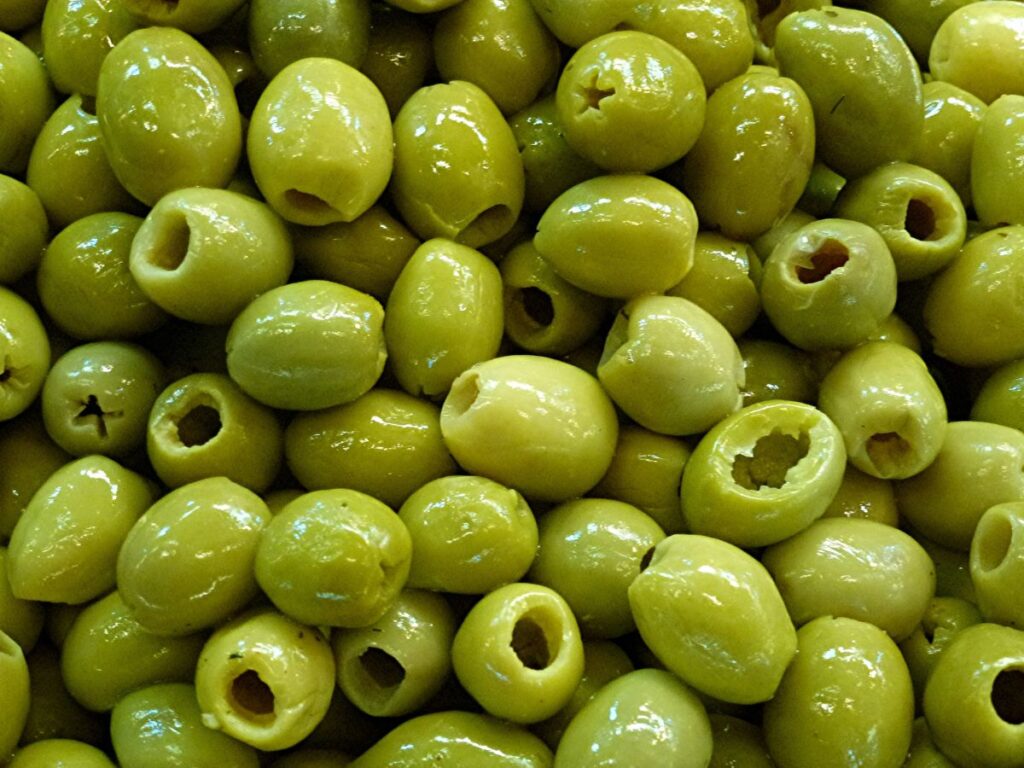
Olives are a fruit that is commonly used in various culinary dishes and snacks. They come in different colors and varieties, including black and green olives. Olives are known for their unique taste and are a good source of healthy fats, Vitamin E, and antioxidants.
But is olive safe for rabbits to eat? Unfortunately, olives are not recommended for rabbits. While they are not toxic, they are high in salt and fat, which can cause digestive issues and obesity in rabbits. Additionally, the high sodium content in olives can be harmful to rabbits and may cause dehydration.
It’s important to note that rabbits have a sensitive digestive system and require a diet that is high in fiber and low in fat and sugar. As such, it’s best to avoid feeding them high-fat and high-salt foods like olives.
Oranges
Oranges are a citrus fruit that is known for their bright color and juicy flesh. They are packed with nutrients like Vitamin C, fiber, and antioxidants, making them a healthy addition to any diet. But is orange safe for rabbits to eat? The good news is that orange is safe for rabbits in moderation.
The flesh of the orange is safe for rabbits to consume, but the peel and seeds are not. The peel of the orange is difficult for rabbits to digest and can cause gastrointestinal issues. The seeds, on the other hand, can be a choking hazard and may cause an obstruction in their digestive system.
To feed your rabbit orange safely, you can offer them small pieces of the flesh as a treat. It’s important to wash the orange thoroughly before feeding it to your rabbit to remove any pesticides or chemicals. Additionally, you can mix small amounts of orange with their regular diet to add some flavor and provide them with a boost of nutrients.
Here’s a table to help you determine how much orange you can offer your rabbit per week according to their age:
| Age of Rabbit | Amount of Orange |
|---|---|
| Under 6 months | Not recommended |
| 6-12 months | 1-2 small pieces |
| Over 12 months | 2-3 small pieces |
Papaya
Papaya is a tropical fruit that is known for its bright orange color and unique flavor. It is packed with nutrients like Vitamin C, fiber, and antioxidants, making it a healthy addition to any diet.
But is papaya safe for rabbits to eat? The good news is that papaya is safe for rabbits in moderation. Papaya contains an enzyme called papain, which can aid in digestion and help prevent gastrointestinal issues in rabbits. However, it’s important to note that papaya is high in sugar, which can cause digestive issues and obesity if consumed in large quantities.
Check the detailed article here: can rabbits eat papaya?
Here’s a table to help you determine how much papaya you can offer your rabbit per week according to their age:
| Age of Rabbit | Amount of Papaya |
|---|---|
| Under 6 months | Not recommended |
| 6-12 months | 1-2 small pieces |
| Over 12 months | 2-3 small pieces |
Peach
Peaches are a type of stone fruit that is closely related to nectarines. They are known for their delicious flavor and bright orange color. Peaches are packed with nutrients like Vitamin C, fiber, and antioxidants, making them a healthy addition to any diet.
But is peach safe for rabbits to eat? The good news is that peach is safe for rabbits in moderation. Peaches are low in calories and contain fiber, which can aid in digestion and help prevent gastrointestinal issues in rabbits. The flesh of the peach is safe for rabbits to consume, but the pit and stem are not.
Here’s a table to help you determine how much peach you can offer your rabbit per week according to their age:
| Age of Rabbit | Amount of Peach |
|---|---|
| Under 6 months | Not recommended |
| 6-12 months | 1-2 small pieces |
| Over 12 months | 2-3 small pieces |
Pear
Pears are a type of fruit that is closely related to apples. They are known for their soft and juicy flesh and come in various colors and varieties. Pears are packed with nutrients like fiber, Vitamin C, and antioxidants, making them a healthy addition to any diet.
Pear is safe for rabbits in moderation. Pears are low in calories and contain fiber, which can aid in digestion and help prevent gastrointestinal issues in rabbits. The seeds of the pear contain traces of cyanide, which can be harmful to rabbits if consumed in large quantities.
Here’s a table to help you determine how much pear you can offer your rabbit per week according to their age:
| Age of Rabbit | Amount of Pear |
|---|---|
| Under 6 months | Not recommended |
| 6-12 months | 1-2 small pieces |
| Over 12 months | 2-3 small pieces |
Persimmon
Persimmons are a type of fruit that is native to Asia and come in various colors and varieties. They are known for their soft and juicy flesh and are often used in various culinary dishes and desserts. Persimmons are packed with nutrients like fiber, Vitamin C, and antioxidants, making them a healthy addition to any diet.
While persimmons are safe for rabbits to consume, it’s important to note that they contain high levels of tannins, which can cause digestive issues and blockages in rabbits if consumed in large quantities. So, I would instead say “NO” to persimmons for rabbits.
Pineapple
Pineapple is packed with nutrients like Vitamin C, fiber, and antioxidants, making it a healthy addition to any diet. Pineapple is moderately safe for rabbits.
The flesh of the pineapple is safe for rabbits to consume, but the skin and core are not. The skin of the pineapple is difficult for rabbits to digest and may cause gastrointestinal issues. Additionally, the core of the pineapple is tough and fibrous, which can be difficult for rabbits to chew and swallow.
However, from my personal experience, I wouldn’t recommend this fruit. If you still want to give it, stick to only one piece and keep it occasionally.
Plum
Plums are a type of fruit that come in various colors and varieties. They are known for their soft and juicy flesh and are often used in various culinary dishes and desserts.
Plums are fairly safe for rabbits. It’s important to note that plums are high in sugar, which can cause digestive issues and obesity if consumed in large quantities. Keep it to a maximum of 1 piece per feed if you’d like to feed a plum to your rabbit.
Pomegranate
Pomegranates are packed with nutrients like fiber, Vitamin C, and antioxidants, making them a healthy addition to any diet. In fact, some believe that pomegranates are juicy and can be a good variety for rabbits. However, if you’re asking about the safety level, it’s recommended to avoid this fruit to your rabbits as every tiny piece of this fruit has seeds in it that’s dangerous.
Raspberries
Raspberries are low in fiber, high in calories, and high in sugar. Raspberries can be given up to 1-2 pieces a week if you’d like to add variety to your rabbit’s diet.
The flesh of the raspberry is safe for rabbits to consume, but the leaves and stems are not. The leaves and stems of the raspberry contain small amounts of toxins that can cause digestive issues and other health problems in rabbits.
Star fruit
Star fruit, also known as carambola, is a type of fruit that is native to Southeast Asia and the Pacific Islands. It gets its name from its unique star-shaped appearance when sliced.
Star fruit is not safe for rabbits to consume as it contains high levels of oxalic acid, which can cause kidney damage and other health problems in rabbits.
Strawberries
Strawberries are a type of fruit that are loved by many for their bright red color and delicious taste. These are moderately safe for rabbits.
To feed your rabbit strawberry safely, you can offer them small pieces of the flesh as a treat. Limit to 1 piece occasionally to your rabbit.
Tangerine
Tangerines are a type of citrus fruit that are loved by many for their bright orange color and juicy flesh. But is tangerine safe for rabbits to eat? The answer is yes, but with moderation!
To feed your rabbit tangerine safely, you can offer them small pieces of the flesh as a treat. It’s important to remove the peel and seeds before feeding it to your rabbit to prevent any digestive issues or choking hazards.
Tomato (green)
Green tomatoes are unripe tomatoes that are often used in various culinary dishes like pickles, chutneys, and fried green tomatoes.
Green tomatoes are not safe for rabbits to consume as they contain high levels of solanine, which can cause digestive issues and other health problems in rabbits. Additionally, the leaves and stems of the tomato plant are also toxic to rabbits and should be avoided.
Watermelon
Watermelon is a type of fruit that is loved by many for its juicy flesh and high water content. It’s a great fruit to enjoy during the hot summer months and is packed with nutrients.
Watermelon is low in calories and high in water content, which can aid in hydration and prevent dehydration in rabbits. To feed your rabbit watermelon safely, you can offer them small pieces of the flesh as a treat.
Here’s a table to help you determine how much watermelon you can offer your rabbit per week according to their age:
| Age of Rabbit | Amount of Watermelon |
|---|---|
| Under 6 months | Not recommended |
| 6-12 months | 1-2 small pieces |
| Over 12 months | 2-3 small pieces |
Can Rabbits Eat Fruits?
Are you looking to add some variety to your rabbit’s diet? Fruits can be a healthy and delicious treat for your furry friend, but it’s important to know which fruits are safe for them to eat and in what quantities. Here’s what you need to know about feeding fruits to your rabbit:
- Fruits should be given to rabbits in moderation, as they are high in sugar and can cause digestive issues and obesity if consumed in large quantities.
- Stick to safe fruits like apples, bananas, blueberries, strawberries, and watermelon. Avoid feeding your rabbit fruits with high levels of sugar like grapes, cherries, and mangoes.
- Always wash fruits thoroughly before feeding them to your rabbit to remove any pesticides or chemicals.
- Remove any seeds, pits, or stems from the fruit before feeding it to your rabbit to prevent choking hazards and digestive issues.
- Offer fruits as a treat in addition to your rabbit’s regular diet of hay, fresh vegetables, and pellets. House Rabbit Society strongly recommends this.
When it comes to feeding fruits to your rabbit, it’s important to introduce them slowly and in small amounts to monitor their reaction. Too much fruit can cause digestive issues like diarrhea, so it’s important to limit their intake. Additionally, it’s important to stick to safe fruits and avoid feeding them fruits with high levels of sugar.
Should Rabbits Eat Fruits?
Fruits can be a healthy and delicious treat for your furry friend, but it’s important to consider a few factors before adding them to their diet.
Rabbits can eat fruits for the sake of variety and better taste. However, they aren’t great for regular addition to the diet.
Here’s what you need to know about whether or not rabbits should eat fruits:
- Fruits are high in sugar and should be given to rabbits in moderation to prevent digestive issues and obesity.
- Fruits should never replace a rabbit’s regular diet of hay, fresh vegetables, and pellets. These foods provide essential nutrients and fiber that are necessary for a rabbit’s health.
- Fruits can be a great source of vitamins and antioxidants when given in small amounts. Stick to safe fruits like apples, bananas, blueberries, strawberries, and watermelon.
- Avoid feeding your rabbit fruits with high levels of sugar like grapes, cherries, and mangoes. These fruits can cause digestive issues and other health problems in rabbits.
If you’re a beginner to raising rabbits, stay careful in feeding fruits and keep an eye on the consequences before finalizing the quantity.
Related Articles

